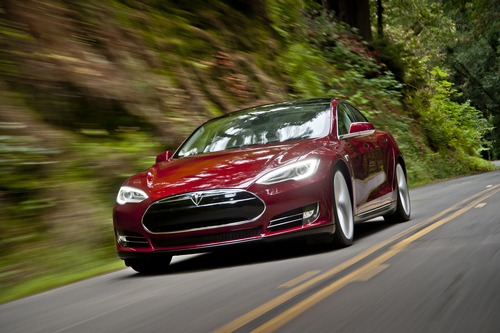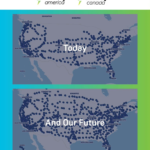Is Tesla’s announcement of profitability for Q1 2013 an elaborate April Fools Joke? Their release did not come out on April 1, but March 31, but a poster on Seeking Alpha makes an interesting case for this. Tesla Motors announced that day that the companies streak of posting massive losses quarter after quarter was due to end, and that for Q1 Tesla will post their first profit ever![]() . To put that into context, for 2012 the company lost nearly $400 million after selling almost 3,000 cars on the year
. To put that into context, for 2012 the company lost nearly $400 million after selling almost 3,000 cars on the year![]() .
.
The reason they’d be profitable in Q1 seemed likely to be due to getting sales and production up to full speed of 20,000 cars a year![]() . After all, for over a year Musk has said time and time again it would require sales of only 8,000 Model S’s a year for Tesla to break even (“cash flow positive”).
. After all, for over a year Musk has said time and time again it would require sales of only 8,000 Model S’s a year for Tesla to break even (“cash flow positive”).
The poster on Seeking Alpha says there’s something else going on than that simple explanation. Instead there are two one-time non-recurring items that will affect Tesla’s financial results for Q1 2013.
The first is a speed-up of the payment schedule for Tesla’s Dept. of Energy loans. Tesla has renegotiated the loan repayment schedule, and will pay it off in five years, by 2017![]() .
.
Tesla Motors was awarded loan guarantees, under the DOE’s Advanced Technology Vehicle Manufacturing Program (ATVM), of $465 million on the same day
Ford was awarded $5.9 billion and Nissan was awarded $1.4 billion. There are two reasons Tesla has for repaying the loan early. First, the interest on the loan is an expense and perhaps it’s a cost Tesla’s management wants to avoid. That seems unlikely because the interest rate is extremely low (sub 1%), making the loans cheap money. Second, accompanying the ATVM loan, Tesla gave the DOE warrants to buy Tesla shares beginning on December 15, 2018.
It’s the second point which the Seeking Alpha poster is focused on. According to him, “the acceleration of its payment schedule reduced the estimated value of the DOE’s warrant by $11” and the “reduction of an estimated future liability will be reported as non-recurring income in Q1.”
The second is the value of the ZEV credits which Tesla Motors earns, and sells to other automakers.
The ZEV Credits are related to California’s ZEV mandate. Every car maker is required to sell a certain portion of their fleet as zero emission cars in order to be allowed to sell cars in California. That was the original goal, however the automakers kicked and screamed and got the program modified. For example fuel cell cars earn a big multiple on ZEV credits, and hybrid cars earn partial credits.
Tesla Motors also earns ZEV credits but does not have any gasoline cars it’s selling with which to offset the ZEV credits. That means Tesla can sell their ZEV credits to other automakers, and earn some revenue on the side while helping the other automakers get away with not fulfilling the ZEV mandate.
In 2012, Tesla earned $40 million in revenue that way, and in Q1 2013 they’re expected to earn $20 million. But it’s thought that the market for ZEV credits is being flooded, and perhaps Tesla’s ZEV credit revenue will fall off.
Two one-time non-recurring pieces of extra revenue – that could be enough to tip Tesla into being profitable, for one corner. That’s what the Seeking Alpha poster suggests. We’ll have to see what happens.
Source: Tesla’s Q1 Earnings, An Epic April Fools Prank![]()
- Highway design could decrease death and injury risk, if “we” chose smarter designs - March 28, 2015
- GM really did trademark “range anxiety”, only later to abandon that mark - March 25, 2015
- US Government releases new regulations on hydraulic fracturing, that some call “toothless” - March 20, 2015
- Tesla Motors magic pill to solve range anxiety doesn’t quite instill range confidence - March 19, 2015
- Update on Galena IL oil train – 21 cars involved, which were the supposedly safer CP1232 design - March 7, 2015
- Another oil bomb train – why are they shipping crude oil by train? – Symptoms of fossil fuel addiction - March 6, 2015
- Chevron relinquishes fracking in Romania, as part of broader pull-out from Eastern European fracking operations - February 22, 2015
- Answer anti- electric car articles with truth and pride – truth outshines all distortions - February 19, 2015
- Apple taking big risk on developing a car? Please, Apple, don’t go there! - February 16, 2015
- Toyota, Nissan, Honda working on Japanese fuel cell infrastructure for Japanese government - February 12, 2015















